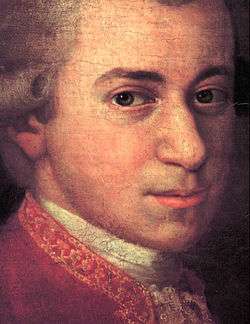Piano Concerto No. 16 (Mozart)
The Piano Concerto No. 16 in D major, KV. 451 is a concertante work for piano, or pianoforte, and orchestra by Wolfgang Amadeus Mozart. Mozart composed the concerto for performance at a series of concerts at the Vienna venues of the Trattnerhof and the Burgtheater in the first quarter of 1784, where he was himself the soloist.[1] Mozart noted this concerto as complete on 22 March 1784 in his catalog, and performed the work later that month. Cliff Eisen has postulated that this performance was on 31 March 1784.[2]
The work is orchestrated for solo piano, flute, two oboes, two bassoons, two horns, two trumpets, timpani and strings. The concerto is in three movements:
Simon Keefe has noted contemporary comments from Mozart's era on how the woodwind writing in this concerto showed a "newly intricate and sophisticated" character compared to Mozart's prior keyboard concerti.[1] M.S. Cole has noted Mozart's use of meter changes in the coda of the finale, starting at measure 315, from 2/4 to 3/8, and subsequent thematic transformations.[3] Joel Galand has noted that the finale, in rondo/ritornello form, avoids use of a new re-entry theme.[4]
References
- 1 2 Keefe, Simon P. (4 November 2001). "'An Entirely Special Manner': Mozart's Piano Concerto No. 14 in E Flat, K.449, and the Stylistic Implications of Confrontation". Music & Letters. 82 (4): 559–581. doi:10.1093/ml/82.4.559. JSTOR 3526277.
- ↑ Eisen, Cliff (December 1994). "Music Reviews: Wolfgang Amadeus Mozart: Klavierkonzerte für Klavier und Orchester. Ausgaben für zwei Klaviere. Urtext; hrsg von. Christoph Wolff und Christian Zacharias". Music & Letters. 51 (2): 733–737. JSTOR 898906.
- ↑ Cole, M.S. (1974). "Mozart Rondo Finales with Changes of Meter and Tempo". Studia Musicologica Academiae Scientiarum Hungaricae. Akadé. T. 16 (Fasc. 1/4): 25–53. doi:10.2307/901841. JSTOR 901841.
- ↑ Galand, Joel (Autumn 2000). "The Large-Scale Formal Role of the Solo Entry Theme in the Eighteenth-Century Concerto". Journal of Music Theory. Duke University Press. 44 (2): 381–450. doi:10.2307/3090682. JSTOR 3090682.
External links
- Konzert in D KV 451: Score and critical report (German) in the Neue Mozart-Ausgabe
